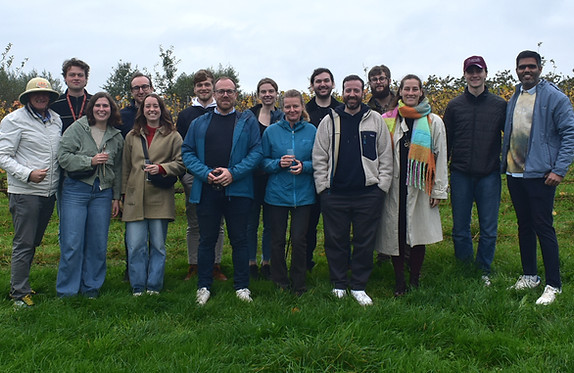

What's new in PGCI?
PhD Vacancy
Induction of unreduced gametes in banana (Musa spp.) to facilitate triploid breeding
Are you passionate about plant reproduction, crop breeding, and cutting-edge research?
We’re excited to share a fully funded PhD position at KU Leuven (Belgium) focused on inducing 2n pollen in banana (Musa spp.) to enable more efficient triploid breeding and unlock genetic variation in this key staple crop.
This multidisciplinary project integrates fundamental plant reproductive biology with applied crop improvement, offering a unique chance to contribute to both basic science and real-world solutions.
Deadline to apply: January 15, 2026
The PGCI Lab is thrilled to announce that Astrid Severyns has completed and successfully defended her PhD thesis! This milestone highlights her perseverance, dedication, and the high-quality research she conducted during her time with us. We are incredibly proud of her achievement.
We wholeheartedly congratulate her and express our deep appreciation for the impact of her work on our lab’s research mission. Our thanks also go to the advisors, committee members, and collaborating institutions whose guidance and support helped make this accomplishment possible.

We’re excited to share our latest publication, "Gibberellin Treatment Impacts Fruit Shape in the Pyrus Communis Cultivar “Conference” Through Increased Retention of Apical Fruit", authored by Hanne Claessen and Han Palmers.
This study investigates the long-suspected link between gibberellin treatments and fruit deformation in the widely cultivated Pyrus communis cultivar “Conference.” These pears are often prone to developing an undesirable “bottle-shaped” appearance, leading to reduced market value and economic losses. By analyzing the effects of gibberellin treatments across two cultivars—“Conference” and “Doyenné du Comice”—and considering flower position within the cluster, the study reveals that gibberellins do not directly deform the fruit. Instead, the treatments promote retention of apical flowers, which naturally produce more elongated fruit, thereby increasing the proportion of misshapen pears.
Read the full study at the link below.
Claessen, H. Palmers, H. Keulemans, W. Van De Poel, B. De Storme, N.
International Journal of Fruit Science, 25(1), 143–159.
DOI: 10.1080/15538362.2025.2497301
New Publications
Claessen, H. Palmers, H. Keulemans, W. Van De Poel, B. De Storme, N.
International Journal of Fruit Science, 25(1), 143–159.
DOI: 10.1080/15538362.2025.2497301
CRISPR–Cas systems and applications for crop bioengineering.
Uranga, M. Martín-Hernández, A.M. De Storme, N. Pasin, F.
Frontiers in Bioengineering and Biotechnology 12 (2024): 1483857
DOI: 10.3389/fbioe.2024.1483857
Claessen, H. Palmers, H. Keulemans, W. Van de Poel, B. De Storme, N.
Front. Genet. Sec. Genomics of Plants and the Phytoecosystem. Volume 15 - 2024 https://doi.org/10.3389/fgene.2024.1360332
Susceptibility to drastic temperature fluctuations and low light levels during plant reproduction.
Begcy, K. Mendes, M.A., De Storme, N.
Front. Plant Sci., Sec. Plant Abiotic Stress, Volume 15 - 2024 | doi: 10.3389/fpls.2024.1369070
Svara, A. De Storme, N. Carpentier, S. Keulemans, W. De Coninck, B.
Horticulture Research, DOI: uhae002

Our mission statement
One of the main scientific challenges in the coming years will be to guarantee a stable food supply in the face of climate change, environmental degradation and an increasing world population. Key to meeting these challenges is the development of new, stress resistant crop varieties for sustainable growth and production.
Therefore, our mission at PGCI is to conduct excellent research in plant sciences for the improvement of fruit production and quality, to protect the environment, and to benefit consumer health.
PGCI works primarily with apple, pear banana and model plant Arabidopsis, applying cutting edge knowledge and technologies to gain understanding into the control of biological processes necessary for modern and efficient fruit breeding and selection programs. We also provide training in the biosciences, actively follow opportunities for knowledge transfer and innovation to industry, and aim to engage the public and other interested stakeholders in dialogue on issues of scientific interest.


